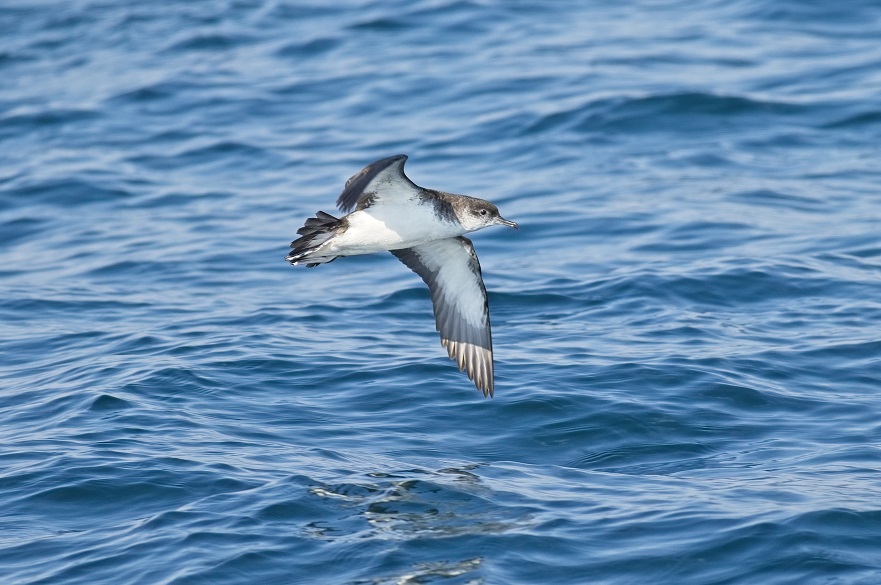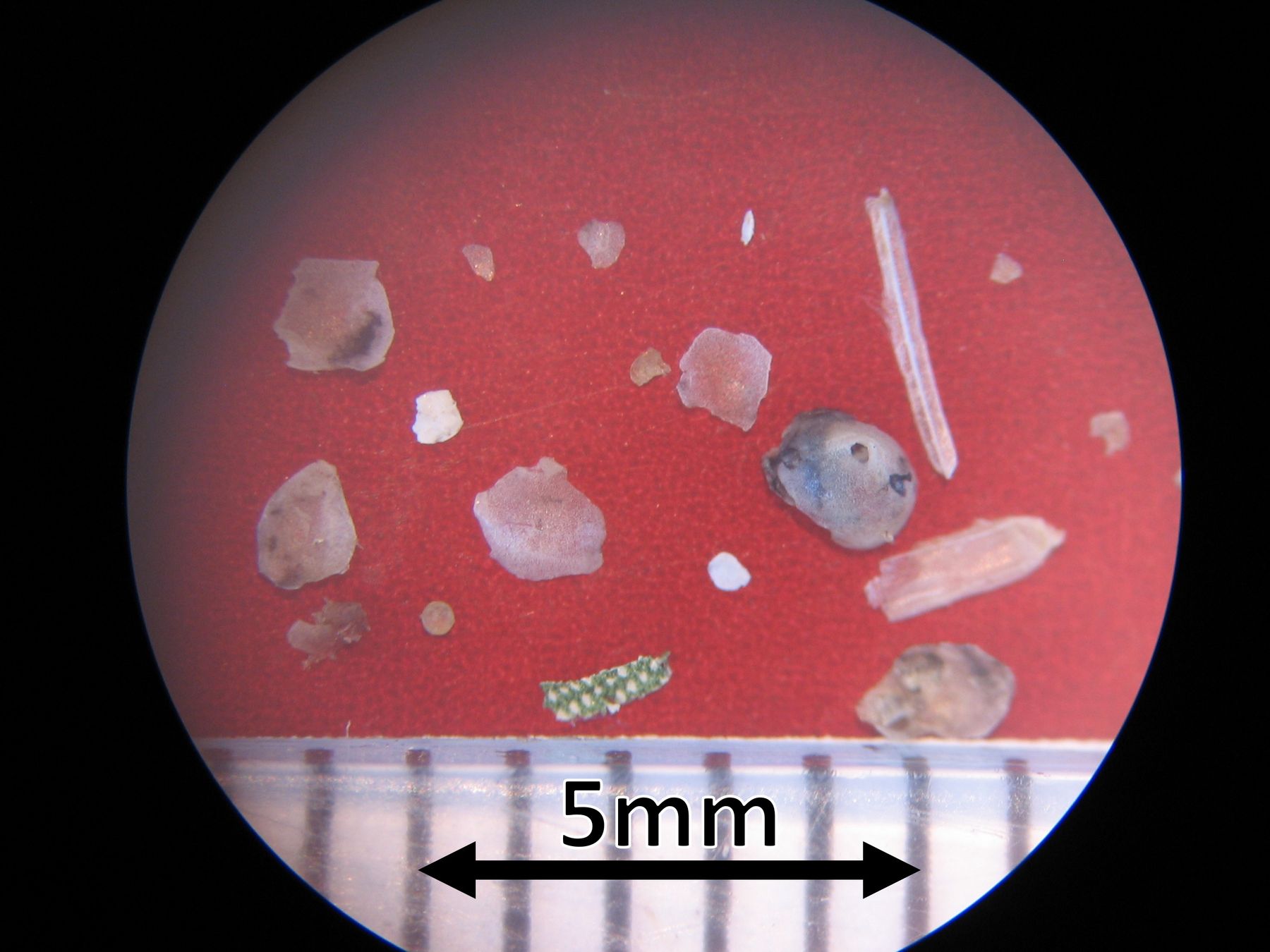Plastic ingestion widespread in Welsh seabird, study suggests
A study of an internationally important breeding population of a seabird – the Manx shearwater – revealed that almost three-quarters had ingested plastic.
By Dave Rogers | Published on 7 November 2022
Categories: Press office; Research; School of Animal, Rural and Environmental Sciences;

Researchers examined the stomach and gut contents of 34 adult and fledgling birds which had been found dead on Skomer Island in Wales.
The team, from Nottingham Trent University, the University of the West of England, the University of Gloucestershire, Bristol Zoological Society and the Wildlife Trust of South and West Wales, found that nine of the 12 fledglings (75%) had ingested at least one piece of plastic, along with 15 of 22 adult birds (68%).
Together the 34 birds had swallowed more than 70 individual pieces, all smaller than 5mm.
Over half of the world’s Manx shearwaters – approximately 440,000 pairs – breed on the Wildlife Trust of South and West Wales’ neighbouring islands of Skomer and Skokholm.
Shearwater chicks remain in their burrows for up to 70 days after hatching, and are consuming plastics along with fish and squid food brought back to the nest burrow and regurgitated by adults.
Adults were found to contain larger plastics than fledglings.
Clear and yellow plastics were most commonly ingested by adults, which the researchers suggest may have been mistaken for prey.
Plastic debris from fishing equipment and river litter is increasingly abundant in the marine environment and seabirds are among the most impacted marine vertebrates.
‘Procellariiformes’ – the order of seabirds which includes shearwaters and their larger cousin the albatross – are mostly surface-feeders and may be particularly susceptible to ingestion of floating plastic.
The researchers argue that the Manx shearwaters may not necessarily have ingested the plastics near to Skomer Island as they forage in the seas of Wales, Ireland, England and North-West Scotland.
They also spend the non-breeding season in the south Atlantic off the coast of Argentina and Uruguay, and so may have ingested plastics on their trans-Atlantic journey.
Manx shearwater prey may ingest microplastics, so indirect plastic consumption is also possible, the researchers say.
While causes of death for the birds found included predation, building collision and starvation, they were mostly unknown, so mortality due to plastic-related causes such as toxicity, or internal wounds, may remain undetected, it is reported.
Dr Louise Gentle, a wildlife conservation researcher in Nottingham Trent University’s School of Animal, Rural and Environmental Sciences, said: “The majority of birds had at least one plastic piece in their gastrointestinal tract. Our study shows that Manx shearwaters on Skomer Island are vulnerable to plastic ingestion and that the adults are likely to pass plastic to their chicks.
“We even found glitter in one of the birds. It was shocking to see so much plastic in the chicks within the first few weeks of their lives.”
Clare Alley, an NTU wildlife conservation graduate who collected data for the study during a placement year on Skomer, said: “This study shows that plastic ingestion is a frequent occurrence for Manx shearwaters that breed on Skomer Island. Although the ingestion rates are not as high as areas of the Pacific Ocean, where the risk is much greater; the potential impact on these birds warrants further study.”

Image showing plastics from the study (Ellie Ames)
Dr Matt Wood, Senior Lecturer in Biology from the University of Gloucestershire who coordinated the study, said: “We need to know more about what’s happening here. While it’s small amounts and nothing like the quantities that some seabirds can carry, where plastic pollution is worse – such as the Pacific – it doesn’t mean it’s having no effect.”
Shanice Arkless, who was a student at the University of the West of England during the study and helped to collect data on fledglings, said: “With increasing amounts of leaked plastic entering the ocean at alarming rates, and evidence of plastic consumption in the gut of young birds, it is imperative to work to protect both adults and fledglings from plastic pollution."
Lisa Morgan, Head of Islands and Marine at the Wildlife Trust of South and West Wales, which was involved in the study, said: “Skomer is world famous for its seabirds, with 800,000 individuals, including Manx shearwaters, puffins and kittiwakes coming to breed every year. Sadly, the finding of plastics ingested by Skomer’s Manx shearwaters is not surprising. It is well known that seabirds act as barometers for the health of our seas.
“Microplastics within these iconic birds reflects the global plastic crisis currently impacting our precious marine life. It is concerning, not only for the welfare of the seabirds themselves, but for the entire marine ecosystem on which they depend.
“Scientists estimate 99% of seabirds could have plastic in their stomachs by 2050 if we continue in the same direction. It is vital that we all reduce the amount of plastic we use in our daily lives and call on the Government to get drastic on tackling plastic.”
The study, is published in the journal Seabird.
Notes for Editors
Press enquiries please contact Dave Rogers, Public Relations Manager, on telephone +44 (0)115 848 8782, or via email.
Nottingham Trent University (NTU) received the Queens Anniversary Prize for Higher and Further Education in 2021 for cultural heritage science research. It is the second time that NTU has been bestowed the honour of receiving a Queen’s Anniversary Prize for its research, the first being in 2015 for leading-edge research on the safety and security of global citizens.
The Research Excellence Framework (2021) classed 83% of NTU’s research activity as either world-leading or internationally excellent. 86% of NTU’s research impact was assessed to be either world-leading or internationally excellent.
NTU was awarded The Times and The Sunday Times Modern University of the Year 2023 and ranked second best university in the UK in the Uni Compare Top 100 rankings (2021/2022). It was awarded Outstanding Support for Students 2020 (Times Higher Education Awards), University of the Year 2019 (Guardian University Awards, UK Social Mobility Awards), Modern University of the Year 2018 (Times and Sunday Times Good University Guide) and University of the Year 2017 (Times Higher Education Awards).
NTU is the 5th largest UK institution by student numbers, with nearly 39,000 students and more than 4,400 staff located across five campuses. It has an international student population of 7,000 and an NTU community representing over 160 countries.
Since 2000, NTU has invested £570 million in tools, technology, buildings and facilities.
NTU is in the UK’s top 10 for number of applications and ranked first for accepted offers (2021 UCAS UG acceptance data). It is also among the UK’s top five recruiters of students from disadvantaged backgrounds and was the first UK university to sign the Social Mobility Pledge.
NTU is ranked 4th most sustainable university in the world and 1st in the UK for sustainability-themed Education and Research in the 2021 UI Green Metric University World Rankings (out of more than 900 participating universities).